Creation Care

The findings directly contradict the Trump administration's policies on climate change. The Environmental Protection Agency has removed mentions of climate change from their website, with administrator Scott Pruitt denying that carbon dioxide is a primary contributor to global warming. "It begs the question, where are members of the administration getting their information from? They’re obviously not getting it from their own scientists," Philip B. Duffy, president of the Woods Hole Research Center, said.

On Capitol Hill, we find Democrats acknowledge climate change, affirm the need for action, and sometimes even express frustration and discouragement that there has not been more action. It is as if they need more hope. On the other hand, we find Republicans continue to minimize climate change as a problem or maximize the unworkable unaffordability of a solution. Yet sometimes, off camera and behind the scenes, we encounter Republicans who fear calling for climate action due to the risk of being “primary-ed” or knocked out of an election in a primary. It is as if they need more courage.

Salvation cannot remain an individualized spiritualized concept. When the psalmists called out for salvation, they meant salvation from present suffering and danger. When the crowd shouted “Hosanna” at Jesus’ arrival in Jerusalem, they weren’t referring to the afterlife. When we talk about salvation in the context of our warming climate, we mean deliverance from the most destructive force our species has ever faced. When it comes to climate change, we have to think about community and salvation in a global sense. We must start to recognize that our communities are mutually dependent upon each other.
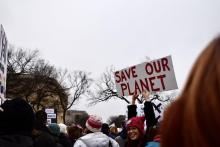
It is crucial for Christians to be involved in this march and supportive of science. Our orientation to the world is to care for all creation, human and non-human. Science, when done humbly and rigorously, recognizing our creaturely place in creation, and seeking understanding over control, enables us to more fully care for the world and draw closer to God. The march for science is an opportunity to stand in solidarity with scientists whose work helps us better understand the world and care for the oppressed.

Divine creativity is one of the things we share with our creator. It is woven into our DNA. We’re active participants in the continuing story of creation whether we like it or not.
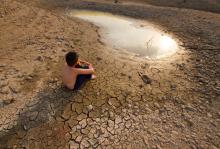
As presidential orders and administrative policies continue to scale back environmental protections, it’s important for Christians to realize that this is a vitally important spiritual issue. Many Christians ignore environmental issues because they don’t view it as an important faith-related concern — but what if environmentalism was essential to evangelism? In many ways, taking care of our environment is a direct form of evangelism, but many Christians have yet to realize — and even reject — this truth.

If confirmed, Pruitt should walk into the halls of the Environmental Protection Agency with the same conviction of faith with which he walks into First Baptist Church of the Broken Arrow. He should promote policies to guard clean water and clean air, to protect children from pollution, and to safeguard all of us from the impacts of a changing climate.

Sometime over the weekend, I noticed a few friends unexpectedly “check-in” to Standing Rock Sioux Reservation, N.D., on Facebook. Given the recent rise in tensions between police and the water protectors protesting the Dakota Access Pipeline, it made sense to me that some of my pastor-friends would go be a part of the protests.

Today we are at another powerful turning point for first Americans, and for all of us. The courageous actions of the Standing Rock Sioux inspires place-based people everywhere. Through the example of prayerful indigenous people at Standing Rock, many Christians are coming to a powerful realization: Protecting our watersheds for future generations is God's call to action for people of all faiths today, just as urgent as it was for previous generations of interfaith activists to abolish slavery or march for civil rights. To protect water is the sacred task of today's generation.

I arise in the morning torn between a desire to improve the world and a desire to enjoy the world. This makes it hard to plan the day. — E.B. White
ON A GORGEOUS FALL DAY, I bundle up just a bit and go sit on the rock under the apple tree in the middle of the field. The low-angled sun pours its subdued warmth onto the splashy orange of the maples, transient yellows of the tamarack, and faithfully green cedar. Further to the west, the mountains cut a postcard-perfect silhouette against the seasonally pale blue sky.
Such grace, warming my heart with joy.
A loving God calls us to experience such profligate joy. Now, in the latter decades of my life, time picks up its pace at an alarming rate. So I often promise myself to seek more opportunities to sit on rocks.
But instead, each morning, the genes of my activist mother, the teachings of my faith, and probably a bit too much of my own hubris conspire to bring on the conflicting desire to “improve” (well, okay ... save) the world.
So I strongly identify with E.B. White’s dilemma, softened by his gentle humor-with-a-touch-of-wistfulness.
Working for social justice seems like forever. I am weary of being tedious to those around me who do not understand my seemingly quixotic campaigns. I am weary listening to the current loud, vicious, largely irrelevant public clamor surrounding issues to which I am dedicated. I am weary knowing that those of us preaching minority positions that were once slammed as unrealistic have been proven right. But it took so long: civil rights, the Vietnam War, apartheid, climate change. As we slogged through our protests and The Powers That Be didn’t listen, lives were lost, billions of dollars spent, time wasted. I am impatient: Why can’t the arc of the moral universe run, rather than just bend, toward justice?
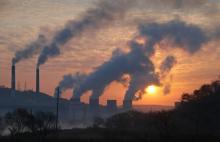
FAITH-BASED COMMUNITIES have been at the forefront of environmental justice work since the phrase first came into use. In 1987, the United Church of Christ’s Commission for Racial Justice published the report Toxic Wastes and Race in the United States. The report—the first of its kind—documented the connection between the siting of hazardous waste sites and the race of the communities where they were located.
For Aaron Mair—an epidemiological-spatial analyst with the New York State Department of Health—environmental justice organizing began in 1984 when he and his family moved to the Arbor Hill neighborhood of Albany, N.Y. The 80-percent-black neighborhood was home to an incinerator that resulted in two of his daughters having upper-respiratory health issues, according to Mair. The neighborhood’s toxic air prompted Mair to begin organizing his community to get the incinerator shut down.
In May 2015, Mair was elected as the first African-American president of the Sierra Club, a national environmental organization with more than 800,000 members. Raven Rakia, a freelance journalist and Grist fellow, interviewed Mair for Sojourners in February.
Raven Rakia: What’s the significance of your becoming the first black president of the Sierra Club?
Aaron Mair: I didn’t start out to make history with the Sierra Club. I started out to make history as an environmental justice activist by elevating the voice of communities of color with regard to equal treatment and protection under the law.

Soon, Earth Day events became part of the fabric of our nation’s community life, churches began taking the Sunday service before or after Earth Day to pray, learn, and take action for God’s creation. As one 2006 Fox News article about Earth Day Sunday put it, “The environment has historically taken a back seat to common faith initiatives like the fight against poverty or hunger ... But now, congregations increasingly see a connection between care for God's creation and social issues.”

There are women in my life I choose to breathe with. With these women, I turn our breath into sounds, sounds into words, and raise them together in solidarity across the currents of justice. Together, we fight for the environment, we fight for rights, for black lives, for women's rights — and constantly strive for peace.

Last November, my deskmates at Sojourners (and my colleagues working all the way on the other side of the office) were interrupted by my joyful whooping and hollering at the news that President Obama had finally, finally killed the Keystone pipeline once and for all. Leading climate activist (and Sojourners contributing editor) Bill McKibben noted that the significance of the decision rippled far beyond Keystone XL itself: It made the president “the first world leader to reject a project because of its effect on the climate.”
Over the years, Keystone XL had become known by activists and journalists alike as “the zombie pipeline” — with delay after delay in the review process and legislative defeats followed by legislative resurrections in Congress as members attempted to expedite approval, the issue just wouldn’t die.

As we begin to walk the path to Easter this Maundy Thursday, Jacqui Rémond invited us to follow Jesus with a servant love of all creation.
“This Easter, I would invite you to replicate Jesus’ model of healing our neighbors … by caring for God’s creation, including humanity and all species,” she said.
Director of Catholic Earthcare Australia, Rémond draws on the words of Pope Francis in Laudato ‘Si, describing the nobility in the duty to care for creation — a duty worked out in small, deliberate acts.

Last night’s Democratic presidential primary debate in Flint, Mich., ran the gamut on issues, from guns to trade to racism to religion.
But it was also the most environmentally focused debate yet in the 2016 campaign.
Here’s a quick summary of the main environmental issues that came up (and a couple that didn’t).
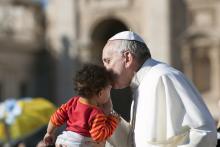
Pope Francis conducted Mass in the Mexican state of Chiapas (home to more than 1 million indigenous people), with Bibles available in different indigenous languages in order to make the ceremony accessible to as many audience members as possible.
Pope Francis minced no words when it came to the environment: “The environmental challenge that we are experiencing and its human causes affects us all and demands our response ... we can no longer remain silent before one of the greatest environmental crises in world history.”
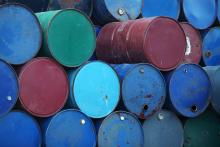
TWO RECENT news items: 1) A new U.N. report finds that over the last 20 years, 4.1 billion people have been injured in extreme weather events—the floods and forest fires that are proliferating as the climate warms. The report adds that the total will keep steeply climbing in the years ahead.
2) Two teams of investigative journalists, following separate document trails, proved in the course of the fall that Exxon—now ExxonMobil, the world’s most profitable company—had known everything there was to know about climate change 25 years ago. And then lied about it, helping to set up the elaborate infrastructure of climate denial that has prevented serious international action on global warming.
I don’t know how to keep these two things in my head at the same time without giving myself over to hatred. I know I’m not supposed to hate, and much of the time I’m able to work on climate change without losing my cool. I can meet oil industry executives, understand the problems that make it hard for them to move quickly; I can and do sympathize deeply with coal miners and tar sands miners whose lives will be disrupted as we take necessary action.
But for Exxon? There have been hours, reading these reports in the Los Angeles Times and the Pulitzer-winning InsideClimate News, when I’ve just found myself in a blind rage, unable to comprehend how people—professed Christians, most of them, in that Texas hotbed of Christianity—could act this way. Their scientists told them quite straightforwardly that burning coal and oil was heating the planet and that it was going to be disastrous. By the mid-1980s, before any politician was talking about climate change, they had good computer models indicating (correctly as it turned out) how much the earth would warm. And they believed those predictions—they helped guide their actions in places like the Arctic, where they were bidding for leases in waters they knew would soon be free of ice.
But they also knew that serious action on climate change would cost them money—would force them to start switching their business from fossil fuel to renewable energy. And so they went to work, helping to set up front groups that hired veterans of the tobacco wars to open a new front of obfuscation. Their CEO, Lee Raymond, gave a speech in Beijing in 1997 insisting that the climate models were hokum, and that the earth was cooling.

Before the announcements of the new agreement at COP 21, when the thousands of people who were not closely engaging with official delegates of the 190 countries gathered in Paris, I was sitting at a small white table with my new found friend Kenneth.
We spoke for nearly an hour before I asked him the question.
We had been talking about the work of the Ghanian Religious Bodies Network On Climate Change, which brings together Muslims, Christians, and Indigenous peoples across Ghana to work on climate change because, after all, “climate change impacts all of us.” We touched upon capacity building, workshops, seminary education, practicalities, and visions. It was the kind of conversation that most people who were not directly involved in the negotiations were in Paris to have: networking, information sharing, and building cross-cultural relationships around common endeavors.
Finally, I asked him, “Are you religious?”
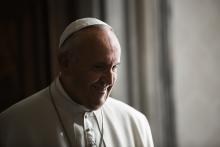
Pope Francis hailed the “historic” climate change agreement signed in Paris, urging the international community to swiftly implement the deal.
Speaking to the faithful in St. Peter’s Square on Dec. 13, Francis called on world leaders to act on the unprecedented environmental agreement signed on Dec. 12 by nearly 200 countries.
“The conference on climate has just finished in Paris with the adoption of an agreement, defined by many as historic. Carrying it out will require a unanimous commitment and generous dedication on everyone’s part,” he said.